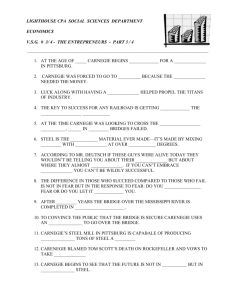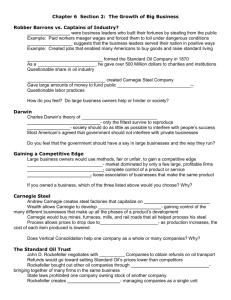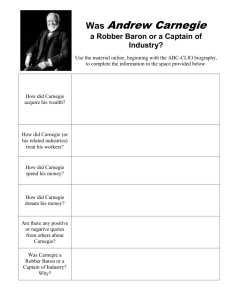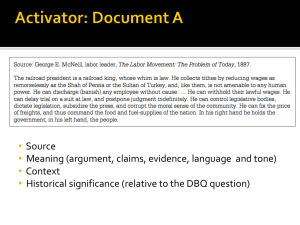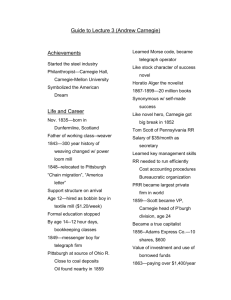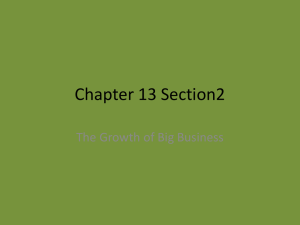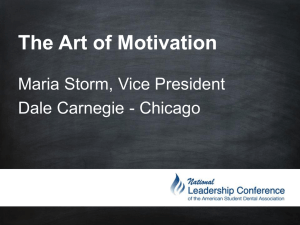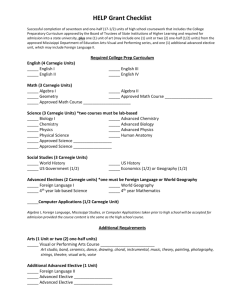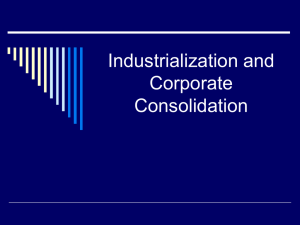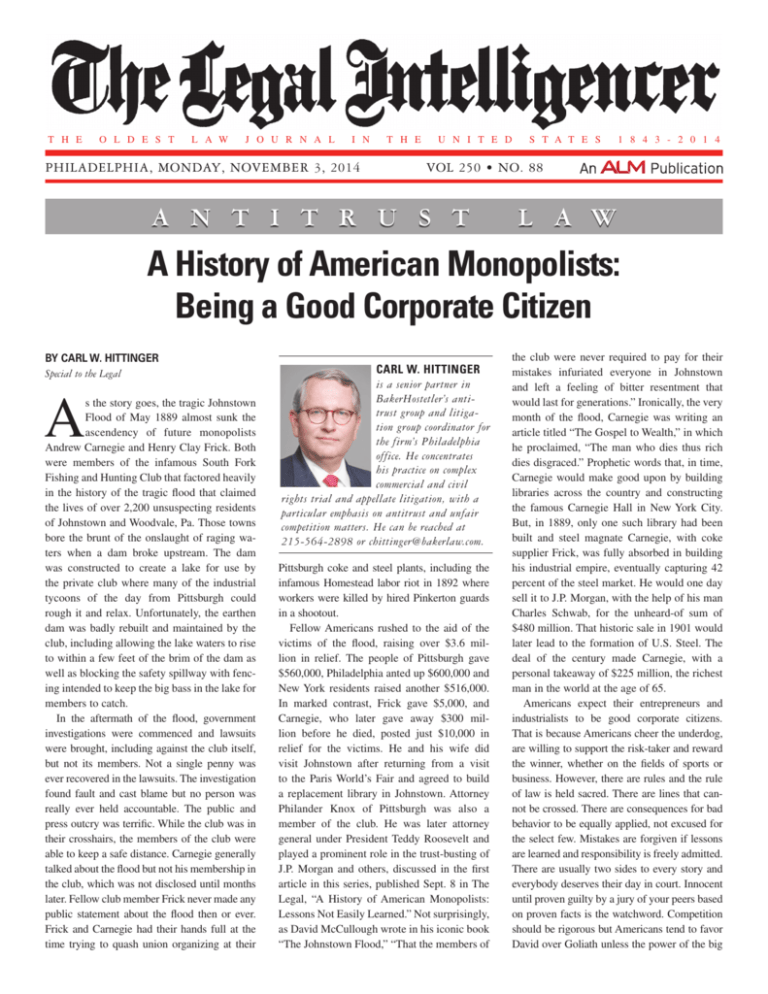
T h e
O l d e s t
L a w
J o u r n a l
i n
philadelphia, Monday, November 3, 2014
t h e
U n i t e d
St a t e s
1 8 4 3 - 2 0 1 4
VOL 250 • NO. 88
A n t i t r u s t
L a w
A History of American Monopolists:
Being a Good Corporate Citizen
By Carl W. Hittinger
Special to the Legal
A
s the story goes, the tragic Johnstown
Flood of May 1889 almost sunk the
ascendency of future monopolists
Andrew Carnegie and Henry Clay Frick. Both
were members of the infamous South Fork
Fishing and Hunting Club that factored heavily
in the history of the tragic flood that claimed
the lives of over 2,200 unsuspecting residents
of Johnstown and Woodvale, Pa. Those towns
bore the brunt of the onslaught of raging waters when a dam broke upstream. The dam
was constructed to create a lake for use by
the private club where many of the industrial
tycoons of the day from Pittsburgh could
rough it and relax. Unfortunately, the earthen
dam was badly rebuilt and maintained by the
club, including allowing the lake waters to rise
to within a few feet of the brim of the dam as
well as blocking the safety spillway with fencing intended to keep the big bass in the lake for
members to catch.
In the aftermath of the flood, government
investigations were commenced and lawsuits
were brought, including against the club itself,
but not its members. Not a single penny was
ever recovered in the lawsuits. The investigation
found fault and cast blame but no person was
really ever held accountable. The public and
press outcry was terrific. While the club was in
their crosshairs, the members of the club were
able to keep a safe distance. Carnegie generally
talked about the flood but not his membership in
the club, which was not disclosed until months
later. Fellow club member Frick never made any
public statement about the flood then or ever.
Frick and Carnegie had their hands full at the
time trying to quash union organizing at their
Carl W. Hittinger
is a senior partner in
BakerHostetler’s antitrust group and litigation group coordinator for
the firm’s Philadelphia
office. He concentrates
his practice on complex
commercial and civil
rights trial and appellate litigation, with a
particular emphasis on antitrust and unfair
competition matters. He can be reached at
215-564-2898 or chittinger@bakerlaw.com.
Pittsburgh coke and steel plants, including the
infamous Homestead labor riot in 1892 where
workers were killed by hired Pinkerton guards
in a shootout.
Fellow Americans rushed to the aid of the
victims of the flood, raising over $3.6 million in relief. The people of Pittsburgh gave
$560,000, Philadelphia anted up $600,000 and
New York residents raised another $516,000.
In marked contrast, Frick gave $5,000, and
Carnegie, who later gave away $300 million before he died, posted just $10,000 in
relief for the victims. He and his wife did
visit Johnstown after returning from a visit
to the Paris World’s Fair and agreed to build
a replacement library in Johnstown. Attorney
Philander Knox of Pittsburgh was also a
member of the club. He was later attorney
general under President Teddy Roosevelt and
played a prominent role in the trust-busting of
J.P. Morgan and others, discussed in the first
article in this series, published Sept. 8 in The
Legal, “A History of American Monopolists:
Lessons Not Easily Learned.” Not surprisingly,
as David McCullough wrote in his iconic book
“The Johnstown Flood,” “That the members of
the club were never required to pay for their
mistakes infuriated everyone in Johnstown
and left a feeling of bitter resentment that
would last for generations.” Ironically, the very
month of the flood, Carnegie was writing an
article titled “The Gospel to Wealth,” in which
he proclaimed, “The man who dies thus rich
dies disgraced.” Prophetic words that, in time,
Carnegie would make good upon by building
libraries across the country and constructing
the famous Carnegie Hall in New York City.
But, in 1889, only one such library had been
built and steel magnate Carnegie, with coke
supplier Frick, was fully absorbed in building
his industrial empire, eventually capturing 42
percent of the steel market. He would one day
sell it to J.P. Morgan, with the help of his man
Charles Schwab, for the unheard-of sum of
$480 million. That historic sale in 1901 would
later lead to the formation of U.S. Steel. The
deal of the century made Carnegie, with a
personal takeaway of $225 million, the richest
man in the world at the age of 65.
Americans expect their entrepreneurs and
industrialists to be good corporate citizens.
That is because Americans cheer the underdog,
are willing to support the risk-taker and reward
the winner, whether on the fields of sports or
business. However, there are rules and the rule
of law is held sacred. There are lines that cannot be crossed. There are consequences for bad
behavior to be equally applied, not excused for
the select few. Mistakes are forgiven if lessons
are learned and responsibility is freely admitted.
There are usually two sides to every story and
everybody deserves their day in court. Innocent
until proven guilty by a jury of your peers based
on proven facts is the watchword. Competition
should be rigorous but Americans tend to favor
David over Goliath unless the power of the big
guy is rightfully earned and properly worn. If
so, such power is deemed worthy and deserving
of being maintained and sometimes increased
as long as the monopolist, as discussed in the
first two articles of this series, continues to
provide societal gain, not self-centered advantage. As the second article, “A History of
American Monopolists: Remembering One’s
Non-Monopoly Roots,” published Oct. 6 in The
Legal, detailed about the rise of Henry Ford,
obtaining, maintaining and increasing monopoly power without causing antitrust backfire
necessitates, first and foremost, abiding by the
antitrust laws if those laws are clearly defined
by Congress, the courts and the enforcement
agencies. Second, monopolists like Ford were
able to maintain and increase market power
because they generally continued to provide innovative products, stellar service, fair treatment
of employees and charge prices to consumers
consummate with the quality of those products
and services. Trying to dominate the market
by quashing the competition while providing
inferior products and lousy service is a recipe
for antitrust disaster.
In addition, Americans are at once more
supportive and even forgiving of companies
and their leaders who are also good corporate
citizens. That means giving back to society
some of what you have taken. Call it dispensing charity, exhibiting philanthropy, providing
pro bono service, rendering a mitzvah or almsgiving, or displaying menschkeit with others
whether perceived or better, real, it is part
of the equation for success. It is also a good
investment to keep the antitrust demons at bay
all things being equal. Even a deserving monopolist will travel a harder road if perceived
as not being a good, giving corporate citizen.
The more you acquire, the greater the expected
return or you risk being branded as greedy,
entitled and arrogant. And, most importantly,
such branding carries the consequence of
being deemed not deserving or worthy of
maintaining and increasing monopoly power.
Some corporate titans learn this fundamental lesson early on, others learn it along the
way, some never learn it and still others learn
it too late to make a real difference. Some try
to polish their tarnished legacy at the end by
employing transparent public relations sleight
of hand. Blue smoke and mirrors. John D.
Rockefeller Sr., who rebuffed Frick’s overture
to buy Carnegie Steel, handed out dimes,
polished by servants, to thousands to create,
in a small way, a favorable impression after
years of being vilified by Ida Tarbell and other
muckrakers. He eventually gave away $540
million before his death in 1937, surpassing Carnegie, who Rockefeller said was his
philanthropic inspiration. Some scoffed at
Rockefeller’s philanthropy, claiming he was
only using tainted money to try to obtain absolution after years of anti-competitive misdeeds.
Others said his trusts had been busted up and
he and his progeny had given back to society
big time with the building, for example, of the
still-grand Rockefeller Center complex in the
midst of the Depression with private money.
Was it too little too late? Was it good deeds belatedly rendered with tainted funds? Perhaps,
but societal gain nonetheless. Would it have
been of better service to society and perceived
as such if the Rockefellers had started this serious philanthropy earlier, during the years of
monopoly ascendency, thereby lessening the
antitrust woes the Rockefellers endured earlier
when their trusts were being busted up? If the
long view had been taken when the empire was
being built, antitrust troubles might have gone
easier. Rockefeller may have underestimated
the American public, who were willing to
reward an innovator but also expected to see a
good corporate citizen in return. In time, that
perception would change but not before much
trust-busting.
The more you acquire,
the greater the expected
return or you risk being
branded as greedy, entitled and arrogant.
Therefore, in 1889, should Carnegie and
Frick have stepped up, particularly considering
their circumstances as members of the vilified
club, and joined in with the other good citizens
across the country to help the victims of the
flood in a manner consummate with their ability to give? Would that forward-thinking have
lessened the antitrust, labor and other challenges they faced in the years ahead? If they
had not hesitated to do the right thing when the
perfect opportunity presented itself, would the
road ahead been smoother? Frick got richer,
even after a huge falling out with Carnegie, but
was almost shot dead in his office by an anarchist. Frick retired to New York City where he
surrounded himself with great art, eventually
gave $50 million to various charities, and
lived out his last days in his grand home that
cost $5.4 million in 1914. He said he wanted
to build a house that would make Carnegie’s
house down the block “look like a miner’s
shack.” The mansion was later donated by his
heirs to the city, designated a national historic
landmark, and became part of his legacy.
Carnegie pursued a different path. He built
Carnegie Hall for $2 million right down the
street from Frick’s house, which has served
the public ever since. Carnegie also built 3,000
libraries around the world, 30 in New York City
alone, costing $60 million. He even gave 8,000
organs to churches to the tune of $6 million. The
list of generous contributions, charitable trusts
and large endowments goes on and that is part
of his legacy. Was it too little too late? Carnegie
would likely have been better served by being
the good corporate citizen on his ascendency
to monopoly power rather than, or even while,
cutting wages, quashing unions and squeezing
railroads and suppliers. Indeed, looking back,
how would history have treated Carnegie if the
Johnstown Flood and Homestead union riots
occurred today in the age of 24/7 media coverage? How would the sale of Carnegie Steel with
42 percent of the market and formation of U.S.
Steel with an even larger market share had gone
down under the current microscopic merger
review environment in Congress, the courts and
regulatory agencies?
Fast forward to today. What lessons can be
learned by corporate America from the adventures of Carnegie and Frick about being a
good corporate citizen? Plenty. Give early and
often on the way up and not transparently on
the way down in a desperate attempt to achieve
salvation, absolution and redemption. Blue
smoke and mirrors just doesn’t cut it anymore.
Carnegie was partially right, “The man who
dies thus rich dies disgraced.” Stay tuned. •
Reprinted with permission from the November 3,
2014 edition of The Legal Intelligencer ©
2014 ALM Media Properties, LLC. All rights reserved.
Further duplication without permission is prohibited. For
information, contact 347-227-3382, reprints@alm.com or
visit www.almreprints.com. # 201-11-14-03

